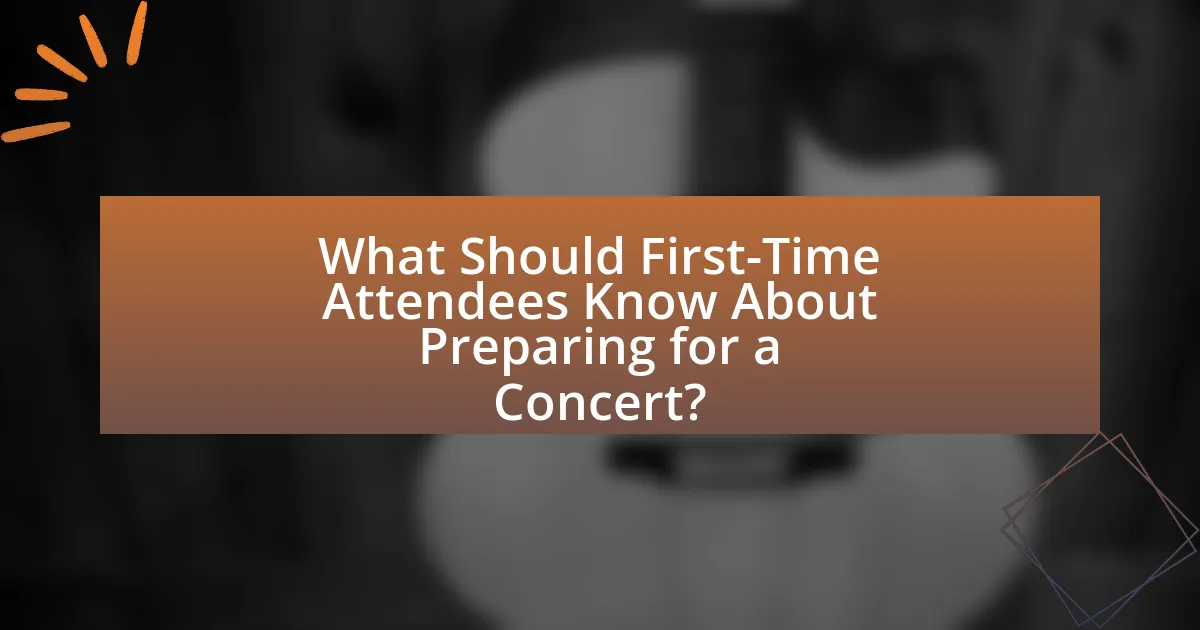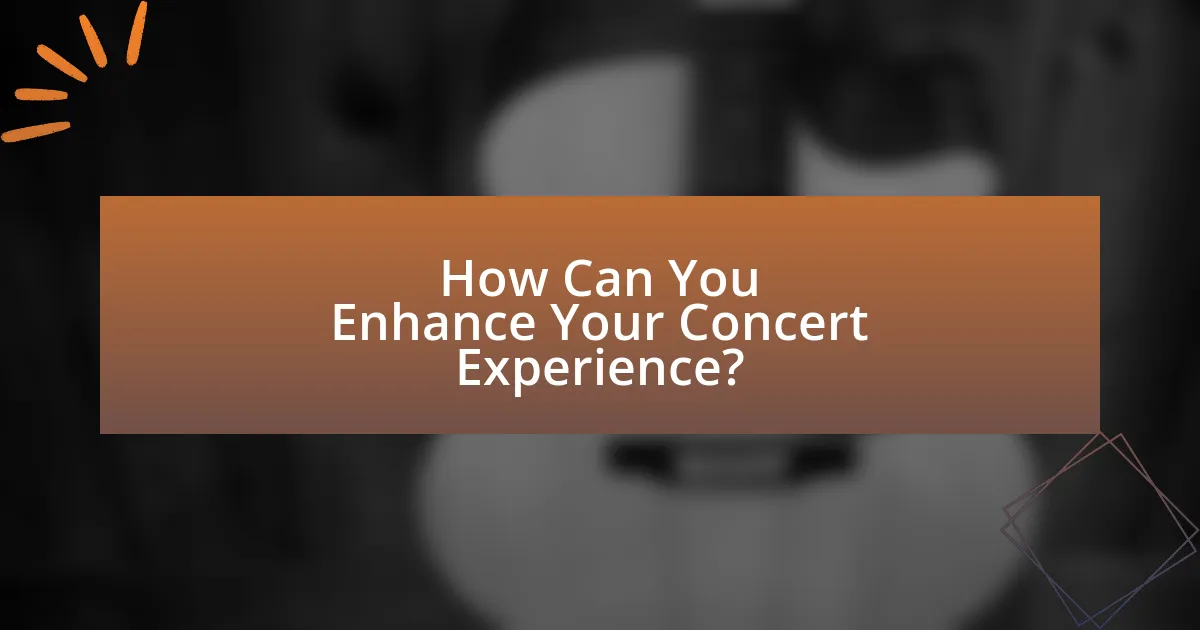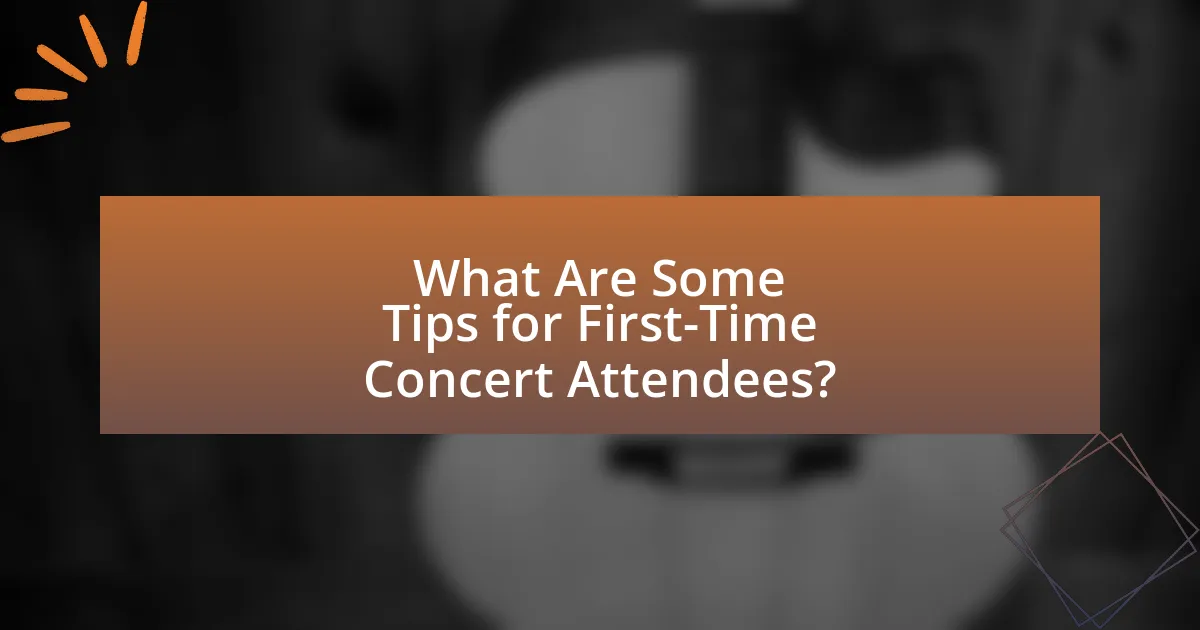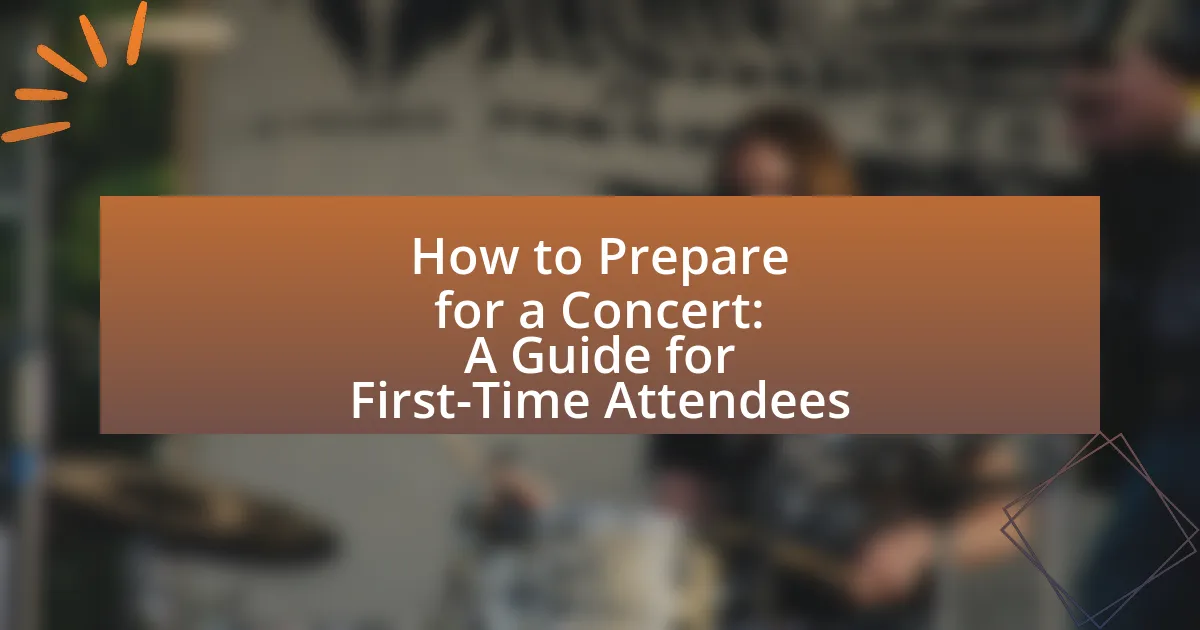The article provides a comprehensive guide for first-time concert attendees, detailing essential preparations for an enjoyable experience. Key topics include the importance of arriving early, understanding venue policies, and selecting the right concert based on personal musical preferences. It also covers practical steps for ticket purchasing, what to bring for comfort and safety, and common etiquette practices to enhance the concert experience. Additionally, the article emphasizes the impact of different music genres on audience engagement and offers tips for capturing memories and utilizing social media effectively during events.

What Should First-Time Attendees Know About Preparing for a Concert?
First-time attendees should know to arrive early, as this allows time for parking, security checks, and finding their seats. Arriving at least an hour before the concert starts is advisable, as many venues can be crowded, and delays are common. Additionally, attendees should familiarize themselves with the venue’s rules regarding prohibited items, such as large bags or outside food and drinks, to avoid issues at entry. Understanding the concert’s setlist or artist’s background can enhance the experience, making it more enjoyable.
How Can You Choose the Right Concert to Attend?
To choose the right concert to attend, first identify your musical preferences and interests. This involves considering genres, artists, and the overall concert experience you desire. For instance, if you enjoy rock music, attending a concert featuring a popular rock band will likely enhance your enjoyment. Additionally, evaluate the venue’s location, capacity, and atmosphere, as these factors can significantly impact your experience. Researching the artist’s recent performances and setlists can also provide insight into what to expect. According to a survey by Eventbrite, 78% of concertgoers prioritize the artist’s popularity and music style when selecting events, highlighting the importance of aligning your choice with your personal taste.
What Factors Should Influence Your Concert Selection?
When selecting a concert, key factors include the artist’s popularity, genre preference, venue location, ticket price, and date availability. Popularity influences the overall experience, as well-known artists often provide higher production quality and larger crowds. Genre preference ensures that the music aligns with personal tastes, enhancing enjoyment. Venue location affects convenience and accessibility, while ticket price must fit within budget constraints. Finally, date availability is crucial to ensure attendance. These factors collectively guide informed concert selection, maximizing enjoyment and minimizing logistical issues.
How Do Different Genres Affect Your Concert Experience?
Different genres significantly affect your concert experience by influencing the atmosphere, audience behavior, and performance style. For instance, rock concerts often feature high energy, loud music, and an enthusiastic crowd, creating an exhilarating environment, while classical concerts typically offer a more subdued atmosphere with quieter audience interactions and a focus on the intricacies of the performance. Research indicates that genre-specific elements, such as instrumentation and tempo, shape audience expectations and engagement levels, impacting overall enjoyment. A study published in the Journal of Music Psychology found that attendees at electronic music festivals reported higher levels of excitement and social interaction compared to those at jazz concerts, highlighting how genre shapes emotional responses and social dynamics at live events.
What Are the Essential Steps to Prepare for a Concert?
To prepare for a concert, attendees should follow these essential steps: purchase tickets in advance, plan transportation, and arrive early. Purchasing tickets ensures entry, while planning transportation helps avoid delays. Arriving early allows time for security checks and finding a good spot. These steps are crucial for a smooth concert experience, as they minimize stress and enhance enjoyment.
How Do You Plan Your Concert Day Schedule?
To plan your concert day schedule, start by determining the concert’s start time and location. Next, allocate time for travel, factoring in traffic and parking, to ensure timely arrival. For example, if the concert begins at 7 PM and the venue is 30 minutes away, plan to leave by 6 PM. Additionally, include time for pre-concert activities such as dining or meeting friends, which can enhance the experience. It is advisable to arrive at least 30 minutes early to navigate entry and find your seat comfortably. This structured approach ensures a smooth and enjoyable concert experience.
What Should You Consider When Buying Tickets?
When buying tickets, you should consider the event date, venue location, ticket price, and seating options. The event date is crucial to ensure availability and your schedule aligns with the concert. Venue location affects travel time and accessibility, which can impact your overall experience. Ticket price varies based on demand and seating choice, so comparing prices across platforms can help you find the best deal. Additionally, seating options can significantly influence your concert experience, as different sections offer varying views and acoustics. According to a study by Eventbrite, 70% of attendees prioritize seating quality when purchasing tickets, highlighting its importance in decision-making.
What Should You Bring to a Concert?
To a concert, you should bring essential items such as tickets, identification, cash or credit cards, a portable charger, and ear protection. Tickets are necessary for entry, while identification may be required for age verification or ticket collection. Cash or credit cards facilitate purchases for food, merchandise, or parking. A portable charger ensures your phone remains charged for communication and capturing memories. Ear protection is important to safeguard your hearing from loud music, as prolonged exposure can lead to hearing damage.
What Items Are Necessary for Comfort and Safety?
Necessary items for comfort and safety at a concert include ear protection, comfortable clothing, hydration supplies, and a portable phone charger. Ear protection, such as earplugs, is essential to prevent hearing damage from loud music, which can exceed 100 decibels. Comfortable clothing allows for ease of movement and enjoyment, while hydration supplies, like a water bottle, help prevent dehydration, especially in crowded venues. A portable phone charger ensures that attendees can maintain communication and access emergency services if needed. These items collectively enhance the overall experience while prioritizing safety and comfort.
Are There Any Restrictions on What You Can Bring?
Yes, there are restrictions on what you can bring to a concert. Commonly prohibited items include large bags, outside food and beverages, weapons, and professional cameras. These restrictions are enforced to ensure safety and enhance the experience for all attendees. Specific policies may vary by venue, so it is advisable to check the venue’s official website for detailed guidelines before attending.

How Can You Enhance Your Concert Experience?
To enhance your concert experience, arrive early to secure a good spot and soak in the atmosphere. Being present before the show allows you to enjoy the opening acts, which can be a great way to discover new music. Additionally, familiarize yourself with the venue layout, including exits and restrooms, to minimize disruptions during the performance. Engaging with fellow concert-goers can also elevate your experience, as sharing excitement and anticipation creates a communal atmosphere. According to a study by the University of California, social interactions at events can significantly enhance enjoyment levels. Therefore, planning ahead and being open to socializing can greatly improve your overall concert experience.
What Should You Know About Venue Policies?
Venue policies dictate the rules and regulations that attendees must follow during events. These policies can include restrictions on items such as bags, cameras, and outside food or beverages, as well as guidelines for behavior and safety protocols. For example, many venues enforce a clear bag policy to enhance security, which requires attendees to use transparent bags for personal items. Understanding these policies is crucial for a smooth concert experience, as violating them can result in denied entry or removal from the venue.
How Do Venue Rules Impact Your Concert Attendance?
Venue rules significantly impact concert attendance by dictating what items are allowed, the behavior expected from attendees, and the overall experience. For instance, strict security measures, such as bag checks and prohibited items like outside food or drinks, can influence whether individuals choose to attend based on convenience and comfort. Additionally, rules regarding age restrictions or dress codes can limit attendance demographics, affecting who can participate in the event. According to a survey by Eventbrite, 70% of concertgoers consider venue policies when deciding to attend, highlighting the importance of these regulations in shaping audience turnout and satisfaction.
What Are Common Etiquette Practices at Concerts?
Common etiquette practices at concerts include respecting personal space, refraining from using flash photography, and being mindful of noise levels. Attendees should avoid blocking the view of others, especially when standing, and should remain seated during quieter songs if seated tickets are purchased. Additionally, it is courteous to wait until the end of a song to leave for restrooms or concessions to minimize disruption. These practices enhance the concert experience for everyone and are widely recognized among concert-goers.
How Can You Prepare for the Atmosphere of a Concert?
To prepare for the atmosphere of a concert, attendees should familiarize themselves with the venue, the artist’s music, and the expected crowd dynamics. Understanding the layout of the venue helps in navigating the space efficiently, while listening to the artist’s discography enhances the overall experience. Additionally, being aware of the crowd’s energy and behavior can help in adjusting personal expectations and reactions. Research indicates that first-time concertgoers who engage with the artist’s work beforehand report higher satisfaction levels during the event.
What Should You Expect in Terms of Crowd Behavior?
At a concert, you should expect a dynamic and energetic crowd behavior characterized by excitement, social interaction, and occasional unpredictability. Concert attendees often engage in collective activities such as singing along, dancing, and cheering, which can create a vibrant atmosphere. However, crowd behavior can also lead to challenges, such as pushing or jostling, especially in densely packed areas. Research indicates that large crowds can exhibit herd behavior, where individuals follow the actions of others, which can amplify both positive and negative experiences (Reicher, 1984, “The St. Pauls Riot: An Analysis of Crowd Behavior”). Understanding these dynamics can help first-time attendees navigate the concert environment more effectively.
How Can You Manage Your Energy During the Event?
To manage your energy during the event, prioritize hydration, take breaks, and engage in deep breathing exercises. Hydration is crucial as it helps maintain energy levels; studies show that even mild dehydration can lead to fatigue. Taking breaks allows for physical and mental recovery, which is essential in high-energy environments like concerts. Deep breathing exercises can reduce stress and increase oxygen flow, enhancing overall stamina. Implementing these strategies effectively supports sustained energy throughout the event.

What Are Some Tips for First-Time Concert Attendees?
First-time concert attendees should arrive early to secure a good spot and familiarize themselves with the venue layout. This allows attendees to navigate restrooms, concessions, and exits efficiently. Additionally, checking the concert’s rules regarding items like bags and cameras can prevent issues at entry. Staying hydrated and wearing comfortable clothing and shoes enhances the overall experience, as concerts often involve standing for long periods. Finally, being aware of the setlist or artist’s previous work can enrich the enjoyment of the performance.
How Can You Make the Most of Your First Concert Experience?
To make the most of your first concert experience, arrive early to secure a good spot and soak in the atmosphere. Being early allows you to familiarize yourself with the venue, enjoy opening acts, and engage with fellow concertgoers. Research shows that attendees who arrive early report higher satisfaction levels, as they can fully immerse themselves in the event. Additionally, familiarize yourself with the setlist and the artist’s background to enhance your appreciation of the performance.
What Are Some Common Mistakes to Avoid?
Common mistakes to avoid when preparing for a concert include not checking the venue’s rules, failing to arrive early, and neglecting to plan for transportation. Not checking the venue’s rules can lead to issues such as being denied entry due to prohibited items, as many venues have specific guidelines regarding bags, cameras, and outside food. Arriving late can result in missing the opening acts or the beginning of the concert, which diminishes the overall experience. Additionally, neglecting transportation planning can cause stress and delays, especially in crowded areas or during peak traffic times. These mistakes can significantly impact the enjoyment of the concert experience.
How Can You Capture Memories from the Concert?
To capture memories from the concert, attendees should take photos and videos during the event. Utilizing a smartphone or a camera allows for high-quality images and recordings that can be revisited later. According to a study by the University of California, capturing experiences through photos enhances memory retention, making it easier to recall the event in the future. Additionally, writing down thoughts or feelings immediately after the concert can further solidify those memories, as noted in psychological research on memory formation.
What Resources Are Available for First-Time Concert Goers?
First-time concert goers can access various resources to enhance their experience, including online guides, mobile apps, and community forums. Online guides, such as those provided by concert venues or ticketing platforms, offer essential information on what to expect, including venue rules, parking options, and safety protocols. Mobile apps like Songkick or Bandsintown help users track their favorite artists, discover upcoming concerts, and receive notifications about ticket sales. Community forums on platforms like Reddit allow first-time attendees to share experiences, ask questions, and receive advice from seasoned concert-goers. These resources collectively equip newcomers with the knowledge and tools needed for a successful concert experience.
Where Can You Find Concert Reviews and Recommendations?
You can find concert reviews and recommendations on music websites, social media platforms, and dedicated review sites. Websites like Pitchfork, Rolling Stone, and Billboard provide professional reviews and audience feedback on concerts. Social media platforms such as Instagram and Twitter feature real-time updates and personal experiences from concert-goers. Additionally, platforms like Yelp and TripAdvisor offer user-generated reviews that can help first-time attendees gauge the quality of performances and venues.
How Can Social Media Enhance Your Concert Experience?
Social media can enhance your concert experience by providing real-time updates, facilitating connections with other attendees, and offering a platform for sharing memories. For instance, platforms like Twitter and Instagram allow fans to receive live updates about setlists, delays, or special announcements directly from the venue or artists. Additionally, social media enables concert-goers to connect with fellow fans, fostering a sense of community before, during, and after the event. Furthermore, sharing photos and videos on social media creates a digital scrapbook of the experience, allowing attendees to relive the concert and engage with others who attended. According to a study by Eventbrite, 80% of attendees share their experiences on social media, highlighting its role in enhancing the overall concert experience.
